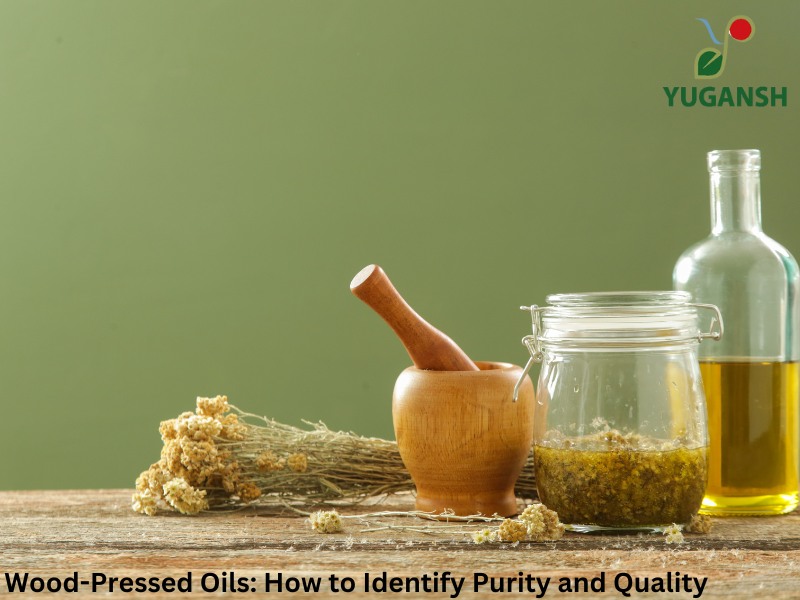Wood-pressed oils have gained popularity for health purposes. Unlike refined oils, most of these types of oil are produced according to these traditional ways. As the process of making them is slow, natural nutrients and flavours remain intact. However, quality and purity cannot be generalised among all the products in the market. Therefore, knowledge about purity and quality is required.
What Are Wood-Pressed Oils?
Wood-pressed oils are extracted through traditional methods. Such products are prepared by seeding or nut cracking under low temperatures. They help preserve nutrients along with giving a natural taste to the oils. Some of the popular varieties in this category include cold-pressed groundnut oil, cold-pressed sesame oil, and kachi ghani mustard oil. These oils possess nutrients and thus are good to use for health-conscious people.
The Benefits of Wood-Pressed Oils
Wood-pressed oils retain every nutrient and are free from harmful chemicals. They are high in their antioxidative values and rich in vitamins and healthy fats. Moreover, they have a singular taste and can be used to cook foods by almost every method of cooking food. For example, cold-pressed sunflower oil is extremely light and contains a good amount of vitamin E content. Although, kachi ghani mustard oil contains a good amount of omega-3 fatty acids, which are good for the heart.
Identifying Pure and Quality Wood-Pressed Oils
Pure wood-pressed oil is pretty hard to identify. Here are some guidelines to lead you on the way.
Colour and texture check
Pure wood-pressed oils are mostly coloured deeper and more intensified. For example, cold-pressed sesame oil is golden in colour. Therefore an oil that is too transparent and pale can be refined. Pure wood-pressed oils are also thicker in texture. Refining oils are mostly light and thin in texture.
Smell the Oil
Pure-pressed oil from wood always has a thick, natural fragrance. For example, kachi ghani mustard oil smells like a fair mix of earthy stench and fragrance. Furthermore, pure oil will always have no smell or an earthy, chemical smell. Pure oils have minimal processing, so the presence of a natural fragrance is an indication of purity.
Taste the Oil
Pure wood-pressed oil tastes distinctly. The taste of pure wood-pressed oil must be fresh and natural. Cold-pressed groundnut oil, for example, will have a rich nutty flavour. Therefore, refined oils have this taste because nutrients are extracted from them. So, one should always taste the oil before purchasing it to evaluate its quality.
Look at the Label
Always read the label before buying wood-pressed oils. These phrases, such as “cold-pressed” or “wood-pressed”, should be on the label. Although, see to it that there are no additives or preservatives in the oil. The top brands would probably blend pure oils with their refined mixes. Thus, it is important to read the label.
Packaging Matters
Quality wood-pressed oils are kept in dark glass bottles. This protects the oil from light, which might mix its nutrients. Quality wood-pressed oils may be affected when the oil is kept in plastic bottles. This is why you always make sure to purchase oils in glass bottles for better purity.
Price as a Quality Indicator
Pure wood-pressed oils are costlier than refined oils. The reason is there is much effort put into the extraction process. If you get very cheap cold-pressed oil, it would probably be adulterated. So it is better to spend a little extra on oils for better health gain.
Testing Purity at Home
Try testing the oil at home using pretty simple methods. The “freeze test” is one of the most common tests. Store the oil in the refrigerator for some time. Additionally, if it freezes and becomes solid, then the oil is pure. In case it does not freeze, then most likely it is an adulterated oil product that definitely must have additives.
The second method is the application of a minute amount of oil onto the surface of your palm. However, pure oil will get absorbed very fast with minimal deposit. In case your skin feels greasy or sticky at once after the application, such oil is probably not pure.
Health Benefits of Using Wood-Pressed Oils
Pure wood-pressed oils in your diet can greatly enhance your health. These oils are full of nutrients that boost your immunity, heart, and skin. Moreover, they are full of healthy fats that are used for digestion. For example, the kachi ghani mustard oil has been said to be anti-inflammatory, and these oils are free from trans fats, so they are great for daily cooking.
Why Choose Wood-Pressed Oils Over Refined Oils?
Such oils go through a refinery process with high-heat chemical usage, which breaks off all the nutrients. Moreover, processed oils incorporate additives that are not quite safe for the body. Wood-pressed oils retain all the natural flavour and nutrients. Moreover, they have no preservatives and chemicals incorporated into their formation. Hence, wood-pressed oils are a choice not just for flavour but for a holistic treatment.
Conclusion
Pure wood-pressed oil should be identified to get the full benefit. It should be rich in natural colour and a little cloudy. It’s good practice to check the taste. The oils should not be given up for prices that are way too cheap. The packing has to be correct. With these simple steps followed, the health benefits of authentic wood-pressed oils can be enjoyed.


